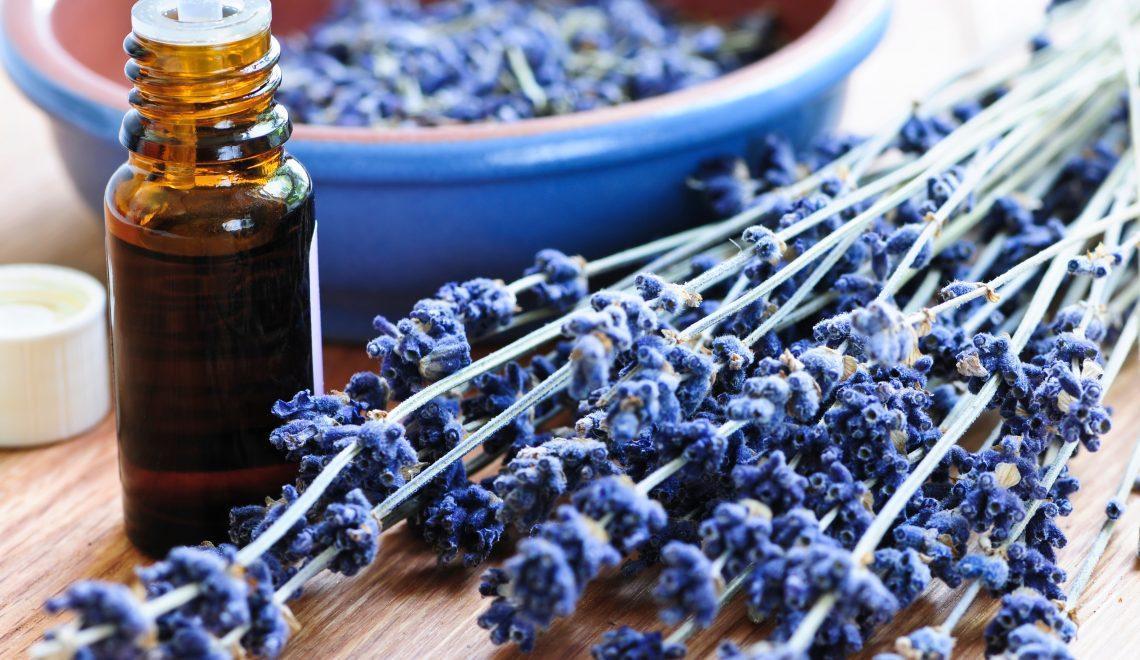
Essential oils have long been used for traditional wellbeing practices and aromatherapy. Usage of botanical extracts can be dated back to at least 4500BC in Egypt. More recently, essential oils have become mainstream as new medical research confirms some of their long-claimed benefits.
Essential oils are concentrated compounds extracted from various plants. These extracts typically smell strongly of the plant they come from, and each has its own therapeutic or medicinal application. Some of the areas essential oils can help with include skin conditions, mental wellbeing, pain, and respiratory problems.

mint essential oil drop falling from dropper into the bottle
Here are five popular essential oils and how you can benefit from them:
- Tea Tree
Tea tree oil, also called melaleuca oil, is known for its antimicrobial, antiseptic, and antifungal properties. It comes from the leaves of the melaleuca alternifolia tree, which is native to Australia.
Tea tree oil is commonly applied topically to help address problems affecting the skin, hair, or nails. Using it is known to help promote healthy skin, reduce acne, relieve dry and itchy skin, and soothe inflammation. It may also be used in the treatment of fungus in nails, maintaining healthy hair and scalp, and is often claimed to reduce keloids that might appear around cartilage piercings.
Like other essential oils, tea tree oil can be harsh in its concentrated form and must be diluted. Applying it to your skin undiluted may cause additional irritation.
You can either mix a few drops into your moisturiser or mix it with a carrier oil. If you like getting creative, you can make a body butter infused with tea tree oil. All the ingredients needed to make your own body butter with essential oils can be found at awo.com.au.
- Lavender
There are numerous mental and physical benefits associated with lavender oil. This essential oil is a must-have in your collection and might become your go-to as a relaxation aide.
Much like tea tree oil, lavender oil can be used for various skin issues. It’s often recommended for treating acne, eczema, dry skin, etc. Lavender oil is also believed to alleviate pain symptoms and headaches—you can apply it as a topical over sore muscle areas, or on the temples when you have a headache.
Lavender oil is probably most well-known for its calming emotional and mental effects. Studies have found that lavender can help you get more slow-wave-sleep. Try putting a few drops into an essential oil diffuser or a humidifier when you’re feeling stressed. Another idea is a spray bottle filled with water—add a few drops of lavender oil, shake well, and spray a bit in your room before bed.
- Peppermint
Peppermint essential oil comes from the leaves of the peppermint plant, and it is said to have energizing properties. You’re probably already familiar with its strong minty fragrance.
If you’re feeling tired, fatigued, or struggling to maintain your focus, you might be reaching for this one. You can mix this into a topical solution, but you may better experience the benefits through inhalation. Researchers tested peppermint and peppermint-blend essential oils and found that inhalation of these can be particularly effective for reducing fatigue after exercise.
Next time you’re feeling tired after a long day, try a taking whiff of peppermint essential oil, or put a few drops into a diffuser or burner.
- Bergamot
Extracted from the skin of a bergamot orange, this one has a unique citrus scent. Bergamot has been used in aromatherapy practices and is even a common note found in many popular fragrances.
Sometimes, being in a tense mood can make difficult tasks more stressful. Keep some bergamot essential oil around for when you need to unwind. The aroma is often used for stress relief and is observed to have a mood-boosting effect. When tested with a group of 50 women, those exposed to bergamot oil for 15 minutes showed a 17% improvement in their positive feelings.
You can try it using any of the methods covered earlier.
- Eucalyptus
Eucalyptus oil may have similar benefits as other oils on this list, but that’s not the main focus here. This plant extract has a cool, strong aroma, and is perhaps most popular for its decongestant properties.
The scent of eucalyptus oil can help ease blocked sinuses, a stuffy chest, and coughing. In a topical solution, it’s been known to provide relief for cold sores and joint pain. The strong smell can also make for an effective bug repellent.
Conclusion
There are many ways you can benefit from essential oils. If you’re experiencing physical or mental problems resulting from what you have to deal with on a regular basis, there’s probably an essential oil that could help make things more manageable. The five oils discussed in this article are some of the most popular. Together, they cover a wide range of common concerns. Use them as you need, but remember to use them safely.
Reference List
- “The History of Essential Oils | Curious History”, Source: https://www.curioushistory.com/the-history-of-essential-oils/
- “Essential oils have gone mainstream, offering proven therapeutic value – Vital Signs – UCLA Health – Los Angeles, CA”, Source: https://www.uclahealth.org/vitalsigns/essential-oils-have-gone-mainstream-offering-proven-therapeutic-value
- “An olfactory stimulus modifies nighttime sleep in young men and women – PubMed (nih.gov)”, Source: https://pubmed.ncbi.nlm.nih.gov/16298774/
- “Does the Fragrance of Essential Oils Alleviate the Fatigue Induced by Exercise? A Biochemical Indicator Test in Rats – PMC (nih.gov)”, Source: https://www.ncbi.nlm.nih.gov/pmc/articles/PMC5684592/
- “Bergamot (Citrus bergamia) Essential Oil Inhalation Improves Positive Feelings in the Waiting Room of a Mental Health Treatment Center: A Pilot Study – Han – 2017 – Phytotherapy Research – Wiley Online Library”, Source: https://onlinelibrary.wiley.com/doi/full/10.1002/ptr.5806
- “9 Amazing Eucalyptus Oil Benefits You Need to Know (healthline.com)”, Source: https://www.healthline.com/health/9-ways-eucalyptus-oil-can-help







